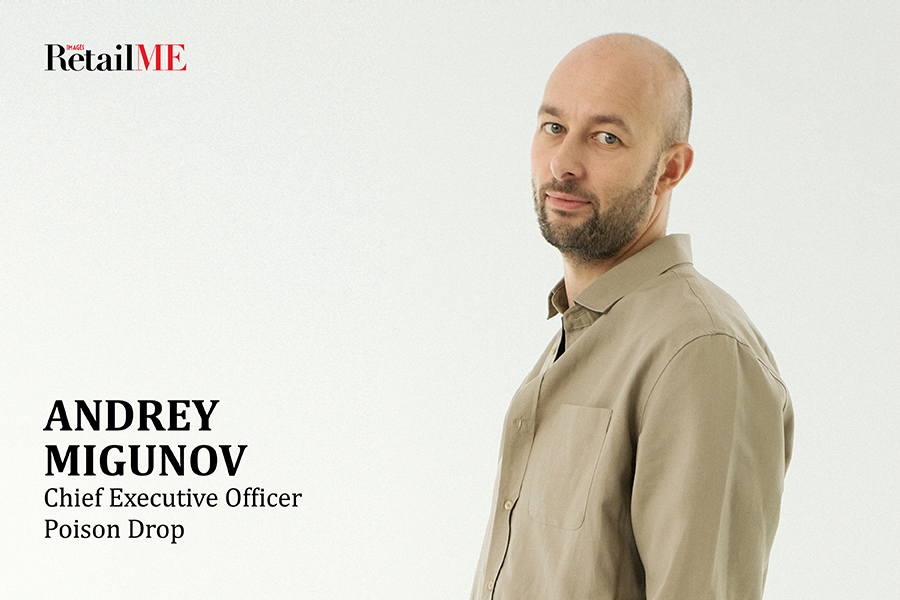
Andrey Migunov, CEO, Poison Drop
Poison Drop is a jewellery department store with a portfolio of over 70 brands from all over the globe, including world-famous and indie designers such as Dior, Marni, Bottega Veneta, Amina Muaddi, Versace, Anissa Kermiche, Eshvi, Tom Wood, Momocreatura, La Manso and many others.
With more than 3,000 eye-catching pieces, Poison Drop caters to any style, budget or occasion. In 2022, Poison Drop expanded to the Middle East by setting up a headquarter in Dubai and launching its website poisondrop.com with international shipping. A year later, in 2023, Poison Drop opened its first brick-and-mortar store in the UAE at the Dubai Hills Mall. The multi-brand store serves as a destination for customers to explore ‘new trends’ in a more captivating setting and in an experiential manner. Operating in a segment that tends to be “guarded” in its approach, letting customers touch and feel only selected pieces of jewellery, Poison Drop breaks away from every such stereotype by welcoming visitors to interact with all its collections, try them on them and buy what suits them.
Poison Drop at a Glance
In conversation with IMAGES RetailME, Andrey Migunov, Chief Executive Officer of Poison Drop talked about the company’s plans for the Middle East market.
The Middle East market is relatively new for Poison Drop. How has the market been treating you so far? What advantages and challenges have you encountered?
Yes, indeed, the Middle East market presents both unique advantages and challenges for us. On the one hand, our brand stands out as one that’s entirely fresh and distinctive in this market. There’s nothing quite like Poison Drop, especially with our focus on fashion jewellery and our unique retail approach. However, this uniqueness also poses a challenge as we need to spend a considerable amount of time educating potential customers about the value and appeal of our products. Many are not accustomed to non-traditional materials like brass in jewellery, so we must invest in storytelling and education to overcome the initial scepticism.
Since storytelling and education play a significant role in your marketing strategy, could you elaborate Poison Drop’s approach in this context?
For us, marketing isn’t just about traditional advertising; it’s about media and storytelling. We invest heavily in content creation across platforms like emailer format highlighting the latest trends and Instagram @poisondropcom to explain not just what we offer, but why it matters. We showcase how our jewellery fits into the current fashion trends, how celebrities wear our pieces and the creative process behind our designs. By positioning ourselves as thought leaders in the fashion jewellery segment, we aim to open our clients to new possibilities and trends.
What are your expansion plans in the Middle East? Are there specific strategies or partnerships you’re considering?
Our goal in the Middle East is to increase awareness and accessibility to Poison Drop products among key audiences such as Emirati & Arabic customers, at the same time cater to the needs of international clientele, including European, American and Russian expats. We’re exploring potential partnerships with well-known department stores to create a ‘shop-in-shop’ concept by showing the value of unique selection done by our team, as we believe our jewellery complements fashion outfits perfectly and could thrive in such environments. By establishing shop-in-shop corners, we aim to introduce Poison Drop to a broader audience and make it easier for customers to incorporate our pieces into their wardrobes.
How does Poison Drop’s omnichannel approach benefit customers?
By operating online and offline, we offer our customers the flexibility to shop on their preferred channel. Our omnichannel approach allows them to purchase online, pick up in-store, or even return items seamlessly.
Looking ahead, what retail trends do you foresee shaping the industry?
The most significant trend we see emerging is the democratisation of the jewellery industry. Customers are seeking inclusivity and the freedom to express themselves through jewellery, regardless of age or gender. We also anticipate a shift towards self-purchasing, with more women buying jewellery for themselves as a form of self-expression. Brands that understand their customers and cater to their individuality will thrive in this evolving landscape.